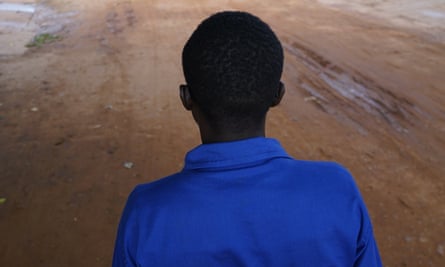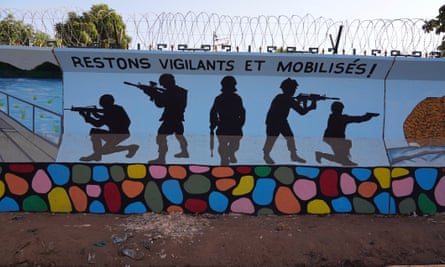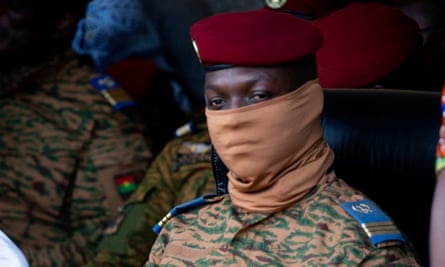“You have to mix Nescafé with drugs, only then will you not be afraid when you go down the mine,” said Salif*, a young man from Kékélesso in western Burkina Faso, describing his experience of working in a goldmine in Mali, a job that almost killed him.
“One day I saw a yellow drum from afar and thought it contained water, but it was acid,” he said. He felt the burning in his hand before he drank the liquid. Not long after, he returned to Burkina Faso to search for work in his home country, his ambition to save up enough money to get married thwarted.
Burkina Faso’s population of 22 million has a median age of 17 – one of the lowest in the world. Six decades after independence from France it faces a big demographic problem: what to do with all its young people.

Salif’s career path reflects that of many of his compatriots: leaving to dig for gold in Mali, returning home, and working a string of precarious jobs. At the moment he is employed as a security guard – one of the few thriving professions in a country ravaged by jihadism.
Others are joining the army, motivated by their support for Ibrahim Traoré, the 35-year-old head of state who came to power after a coup d’état in September 2022.
Some young men are still joining armed groups, including those allied with al-Qaida and Islamic State.
Burkina Faso has been beset by a wave of violence between armed groups, the army, and pro-government militias that began in 2015 and has since claimed thousands of lives and displaced almost 2 million people. Last Thursday the junta declared a “general mobilisation” to give the state “all necessary means” to combat a string of jihadist attacks since the start of this year. Traoré has set a goal of recapturing 40% of the country’s territory that is estimated to be controlled by jihadists.
Earlier this month, 44 civilians were reported killed by “armed terrorist groups” in two villages in north-eastern Burkina Faso, near the Niger border, in one of the deadliest attacks since Traoré came to power. In February, 51 soldiers were killed in an attack on Deou, in the far north of Burkina Faso.

According to a report by the United Nations development programme published in February, the first reason young men give for joining armed groups is a stable source of income. They also join for status. “One of the attractions of these groups derives, in part, from the pressure on men to prove their manhood,” the report said.
Sometimes young people are left without a choice. “It’s either join them or face death,” said a source who works in the field of youth literacy in Bobo-Dioulasso and is familiar with jihadi recruitment.
Attempts by the state to reassert control sometimes end in abuses being committed against civilians, as was the case in December in Nouna, a town of 30,000 inhabitants in northern Burkina Faso.
According to Amnesty International, a group of government-supporting paramilitaries killed and burned 86 people who were accused of taking part in a jihadist attack on a national police post. Some of those who fled have ended up living in Bobo-Dioulasso, such as one young woman who left her shop behind.

“In the village, if someone came to buy a bottle of cooking oil from you, you would sell it to them, but then the army comes and tells you that you are aiding the terrorists,” she said. She now works as a maid.
From childhood, Salif was determined not to follow in his father’s footsteps as a cotton farmer, where profits are low and the working conditions difficult.
Burkina Faso exports nearly 90% of its cotton, and the added value is often captured by other countries that manufacture it, and clothing companies. Moreover, the US, the world’s leading cotton exporter, provides annual subsidies to its farmers that amount to 10% of Burkina Faso’s GDP, resulting in an unfair competition for its farmers.
Salif said he did not have it in him to take up arms, whether it be with the army or a jihadist outfit. “I’m afraid of blood. I haven’t ended up in a jihadist group because I have a soft heart,” he said.
Instead, as he pondered his future, his thoughts turned to religion. “I only wait for God. He has the last word, and he is the one who has saved me many times in my life.”
* Not his real name

 1 year ago
60
1 year ago
60










 English (US)
English (US)